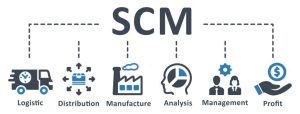Supply Chain Management (SCM) is the coordinated process of planning, implementing, and controlling the flow of goods, services, and information from the point of origin to the final consumer or end-user. It involves the management and optimization of various interconnected activities and functions within a network of suppliers, manufacturers, distributors, retailers, and customers.
The primary goal of supply chain management is to ensure that products or services are delivered to the right place, at the right time, in the right quantity, and at the right cost. It aims to create a seamless and efficient flow of materials, information, and funds throughout the supply chain to maximize customer value while minimizing costs and inventory.
Key elements of supply chain management include:

ORIZA provide a centralized platform that streamlines various aspects of business operations, including finance, human resources, manufacturing, and inventory management. When SCM is integrated into ERP, it enhances these advantages and brings additional benefits to the organization.
Here are some key benefits of supply chain management:
- Enhanced Visibility: it provides real-time visibility into the entire supply chain, from procurement to delivery. This comprehensive view allows businesses to track inventory levels, monitor production processes, and identify potential bottlenecks or issues, enabling proactive decision-making.
- Inventory Optimization: businesses can optimize their inventory levels based on demand forecasting, production schedules, and sales data. This reduces excess inventory and carrying costs while ensuring sufficient stock availability to meet customer demands.
- Streamlined Order Management: its enables seamless order processing and fulfillment. Customer orders are automatically linked to inventory availability, production schedules, and shipping logistics, minimizing order processing time and improving order accuracy.
- Cost Reduction: Effective supply chain management helps identify areas of inefficiency and waste, allowing organizations to streamline processes and reduce overall supply chain costs. This includes savings from optimized inventory management, reduced lead times, and better supplier management.
- Improved Collaboration: SCM fosters collaboration among different departments within the organization and with external partners such as suppliers and distributors. Improved communication and data sharing lead to better coordination and efficiency throughout the supply chain.
- Demand Forecasting: ERP’s SCM capabilities can leverage historical data and market trends to create more accurate demand forecasts. This helps businesses plan their production and procurement processes more effectively, minimizing the risk of stockouts or excess inventory.
- Better Customer Service: By having a well-coordinated supply chain, businesses can improve their ability to meet customer demands promptly and accurately. This leads to enhanced customer satisfaction and loyalty.
- Compliance and Traceability: ensures better compliance with industry regulations and standards. It allows businesses to track the origin and movement of goods throughout the supply chain, enhancing product traceability and ensuring compliance with quality and safety standards.
- Supply Chain Risk Management: ERP with SCM capabilities enables businesses to identify and mitigate supply chain risks more effectively. This includes the ability to assess supplier performance, diversify sourcing options, and implement contingency plans for potential disruptions.
- Continuous Improvement: With the data and insights provided by SCM in ERP, organizations can continuously evaluate and improve their supply chain processes, optimizing performance over time and staying competitive in the market.
In summary, integrating Supply Chain Management with ERP systems brings synergistic advantages, helping organizations achieve greater efficiency, reduce costs, improve customer service, and maintain a competitive edge in the dynamic business environment.






